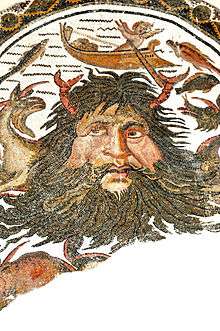Pontus (mythology)
In Greek mythology, Pontus (/ˈpɒntəs/; Greek: Πόντος, Póntos, "Sea")[1] was an ancient, pre-Olympian sea-god, one of the Greek primordial deities. Pontus was Gaia's son and has no father; according to the Greek poet Hesiod, he was born without coupling,[2] though according to Hyginus, Pontus is the son of Aether and Gaia.[3]
| Pontus | |
|---|---|
| Member of the Primordial Gods and Sea Gods | |
 Pontus in an ancient Roman mosaic, Tunisia | |
| Abode | Sea |
| Personal information | |
| Parents | Gaia |
| Siblings | Uranus |
| Consort | Gaia, Thalassa |
| Offspring | Nereus, Thaumas, Phorcys, Ceto, Eurybia |
Mythology
For Hesiod, Pontus seems little more than a personification of the sea, ho pontos ("the sea") by which Hellenes signified the Mediterranean Sea.[4] With his mother, Gaia, he fathered Nereus (the Old Man of the Sea), Thaumas (the awe-striking "wonder" of the Sea, embodiment of the sea's dangerous aspects), Phorcys and his sister-consort Ceto, and the "Strong Goddess" Eurybia. With the sea goddess Thalassa (whose own name simply means "sea" but is derived from a Pre-Greek root), he fathered the Telchines and all sea life.[2][5][6][7]
In a Roman sculpture of the 2nd century AD, Pontus, rising from seaweed, grasps a rudder with his right hand and leans on the prow of a ship. He wears a mural crown, and accompanies Fortuna, whose draperies appear at the left, as twin patron deities of the Black Sea port of Tomis in Moesia.
Family tree
| Gaia | |||||||||||||||||||||||||||||||||||||||||||||||||||||||||||||||||||||
| Pontus | Thalassa | ||||||||||||||||||||||||||||||||||||||||||||||||||||||||||||||||||||
| Nereus | Thaumas | Phorcys | Ceto | Eurybia | The Telchines | Halia | Aphrodite (Uranus's genitalia) [8] | ||||||||||||||||||||||||||||||||||||||||||||||||||||||||||||||
| Echidna | The Gorgons[9] | Graeae | Ladon | The Hesperides | Scylla[10] | The Sirens | Thoosa[11] | ||||||||||||||||||||||||||||||||||||||||||||||||||||||||||||||
Sources
Hesiod
|
Hyginus
- From Aether and Earth [i.e. Gaia]: Grief, Deceit, Wrath, Lamentation, Falsehood, Oath, Vengeance, Intemperance, Altercation, Forgetfulness, Sloth, Fear, Pride, Incest, Combat, Ocean, Themis, Tartarus, Pontus; and the Titans, Briareus, Gyges, Steropes, Atlas, Hyperion, and Polus, Saturn, Ops, Moneta, Dione; and three Furies – namely, Alecto, Megaera, Tisiphone.[3]
See also
Notes
- Ultimately from Proto-Indo-European *pont-eh1-, *pn̩t-h1, "path" (see R. S. P. Beekes, Etymological Dictionary of Greek, Brill, 2009, p. 1221).
- Evelyn-White, Hugh G. Ed. (1914). The Homeric Hymns and Homerica with an English Translation. London: William Heinemann Ltd.
- Hyginus. Fabulae, Preface
- The Black Sea was the Greeks' ho pontos euxeinos, the "sea that welcomes strangers."
- Rengel, Marian (2009). Greek and Roman Mythology A to Z. Infobase Publishing. p. 119. ISBN 9781604134124.
- Morford, Mark P. O. (1999). Classical Mythology. New York: Oxford University Press. pp. 98, 103. ISBN 9780195143386.
- Turner, Patricia (2001). Dictionary of Ancient Deities. Oxford University Press. p. 387. ISBN 9780195145045.
- There are two major conflicting stories for Aphrodite's origins: Hesiod (Theogony) claims that she was "born" from the foam of the sea after Cronus castrated Uranus, thus making her Uranus' daughter; but Homer (Iliad, book V) has Aphrodite as daughter of Zeus and Dione. According to Plato (Symposium 180e), the two were entirely separate entities: Aphrodite Ourania and Aphrodite Pandemos.
- Most sources describe Medusa as the daughter of Phorcys and Ceto, though the author Hyginus (Fabulae Preface) makes Medusa the daughter of Gorgon and Ceto.
- Various Greek myths account for Scylla's origins and fate. According to some such as Eustathius, she was one of the children of Phorcys and Ceto. Other sources, including Stesichorus, cite her parents as Triton and Lamia. Hyginus says Scylla was the daughter of the river god Crataeis.
- Homer, Odyssey, 1.70–73, names Thoosa as a daughter of Phorcys, without specifying a mother.
References
- Gaius Julius Hyginus, Fabulae from The Myths of Hyginus translated and edited by Mary Grant. University of Kansas Publications in Humanistic Studies. Online version at the Topos Text Project.
- Hesiod, Theogony from The Homeric Hymns and Homerica with an English Translation by Hugh G. Evelyn-White, Cambridge, MA.,Harvard University Press; London, William Heinemann Ltd. 1914. Online version at the Perseus Digital Library. Greek text available from the same website.